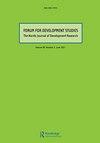讲述全球南方的绿色经济
IF 1.1
Q3 DEVELOPMENT STUDIES
引用次数: 3
摘要
摘要本文讨论了持久而有力的叙事如何影响和塑造全球南方的绿色经济。绿色经济战略往往围绕着全球危机的市场和技术解决方案发展,特别是在工业化国家。然而,在资源基础丰富的发展中国家,绿色转型往往意味着自然资源管理、利用和控制方式的各种形式的现代化。我认为,这是精英们通过叙事来塑造绿色经济议程的过程的结果,这些叙事融入并为全球南方资源丰富国家的绿色经济话语和政策提供信息。尽管许多文献讨论了全球南方多样化的绿色经济计划及其结果,但本文讨论了这些实践和政策是如何由强有力的叙事驱动的,这些叙事基本上塑造了绿色经济议程。我认为,关于资源稀缺、退化和人口过剩的新马尔萨斯主义叙事与资源丰富的叙事共存,认为原始自然资源巨大,但受到威胁,资本、“专业知识”和技术可以保护和开发这些资源,同时积累经济增长。因此,全球南方的绿色经济往往是在自然资源管理现代化的话语下讲述和实施的。本文章由计算机程序翻译,如有差异,请以英文原文为准。
Narrating Green Economies in the Global South
Abstract This paper discusses how persisting, powerful narratives inform and shape the green economy in the Global South. Green economy strategies often evolve around market-based and technological solutions to the planetary crises, particularly in industrialized countries. In developing countries with rich resource bases, however, green transitions often imply various forms of modernization of the ways in which natural resources are managed, utilized and controlled. This, I argue, is a result of the process in which the green economy agenda is shaped by elites through narratives that feed into and inform green economy discourses and policies in resource-rich countries in the Global South. While much literature discusses variegated green economy schemes in the Global South and their outcomes, this paper discusses how these practices and policies are driven by powerful narratives that essentially shape green economy agendas. I argue that a persisting neo-Malthusian narrative of resource scarcity, degradation and overpopulation co-exists with a resource abundance narrative, holding that pristine natural resources are vast, but under threat, and that capital, ‘know-how’ and technology can protect and develop these resources while at the same time accumulate economic growth. As a result, the green economy in the Global South is often narrated and implemented under a discourse of modernization of natural resource management.
求助全文
通过发布文献求助,成功后即可免费获取论文全文。
去求助
来源期刊

FORUM FOR DEVELOPMENT STUDIES
DEVELOPMENT STUDIES-
CiteScore
1.80
自引率
14.30%
发文量
24
期刊介绍:
Forum for Development Studies was established in 1974, and soon became the leading Norwegian journal for development research. While this position has been consolidated, Forum has gradually become an international journal, with its main constituency in the Nordic countries. The journal is owned by the Norwegian Institute of International Affairs (NUPI) and the Norwegian Association for Development Research. Forum aims to be a platform for development research broadly defined – including the social sciences, economics, history and law. All articles are double-blind peer-reviewed. In order to maintain the journal as a meeting place for different disciplines, we encourage authors to communicate across disciplinary boundaries. Contributions that limit the use of exclusive terminology and frame the questions explored in ways that are accessible to the whole range of the Journal''s readership will be given priority.
 求助内容:
求助内容: 应助结果提醒方式:
应助结果提醒方式:


